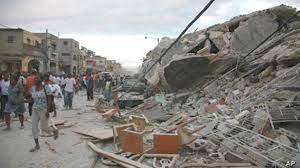Haiti In The Throes Of Political, Economic, And Natural Disasters
Central America, Featured, Latest Headlines Wednesday, August 25th, 2021
(AFRICAN EXAMINER) – If you think that the problems of Haiti do not concern you, I am afraid, you may be mistaken. Haitian’s are descendants of slaves mostly from West Africa, including Nigeria. Some of these slaves might well have shared the same lineage with your ancestors hundreds of years ago.
Besides, as a country of Blacks in the Western Hemisphere, Haiti offers a reference point for evaluating Africans at home and in the Diaspora. Former President Donald Trump saw Haiti and African countries as one, referring to them as “shithole” countries. That’s why Haitian poverty, illiteracy, corruption, insecurity, and underdevelopment should be sore points for Africa and Africans.
Nobody seems to care anymore about how Haiti came to be and why it remains a troubled nation. The contemporary focus is on one crisis or the other. In the last 20 years or so, these crises seem to have reached boiling point.
Haiti has been boiling since inception. What eventually became Haiti was originally born out of conflict between the Spanish and the French over the western portion of the island of Hispaniola, all of which was a Spanish colony. In resolving the dispute, the western part of the island, where the French had settled by 1625, was ceded to France in 1697.
For nearly two centuries (1625-1804), the French colonists extracted the last drop of labour from African slaves brought in to work on the sugar cane and coffee plantations. The slaves died young under harsh labour and unfamiliar diseases but the slave masters kept replenishing them with newly imported slaves from West Africa. By the time of the French Revolution in 1789, the colony had emerged as France’s richest colonial possession and one of the richest colonies in the world.
However, the economic boom would perish under recurrent conflicts, heavy debts, corruption, and political instability.
It all started with the struggle for independence. Piggybacking on the French Revolution, the slaves mounted their own revolution against the French. After 12 years of conflict, Napoleon Bonaparte’s army was defeated and the French territory was renamed Haiti on independence on January 1, 1804. By this feat, Haiti became the only nation in history that was established by a successful slave revolt; the first country to abolish slavery; and the first independent nation of the Caribbean and Latin America.
These feats notwithstanding, Haiti would know no peace. First, fearful of the spread of independence revolt to American slaves, the American government pursued international isolation of the newly independent nation.
Second, the French returned with warships to demand compensation for the loss of their colony and the plantations. By today’s standards, the agreed sum would be well over a trillion dollars. This would further seriously undercut Haiti’s economic activities. By the time the compensation was fully paid in 1947, Haiti was already sinking under political turmoil.
For a century after independence, Haiti struggled but made no progress. Continued political instability in the early 1900s led to American fears of foreign intervention. As a result, the United States occupied the country for 19 years between 1915 and 1934.
(The Nation)
Related Posts
Short URL: https://www.africanexaminer.com/?p=67033




















